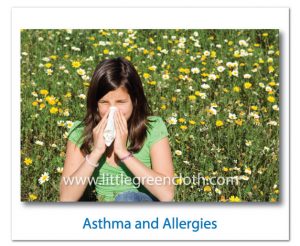 Allergies and Asthma are two of the most common health problems today; they are chronic illnesses that require careful attention. With the proper medication and careful monitoring people can have a comfortable life by avoiding the causes that can trigger an allergy or asthma attack.
Allergies and Asthma are two of the most common health problems today; they are chronic illnesses that require careful attention. With the proper medication and careful monitoring people can have a comfortable life by avoiding the causes that can trigger an allergy or asthma attack.
In this article, you will know what comprises an allergy and asthma along with their symptoms, causes and medication.
What Is Allergy?
An allergy is a hypersensitivity disorder of the immune system. An allergic reaction occurs when a person’s immune system reacts to normally harmless substances in the environment. Particles in the air or pollens come in contact with lymphocytes or small white blood cells which carry out the functions of the immune system. People with no allergies react very little or not at all when exposed to the same conditions. The reason for the allergic is that the body releases certain chemicals as a response to the exposure; no one knows why people develop allergies however it can be a matter of genetics at times or can be caused from a previous illness. Allergies can happen at any time of your life, but are most common during young adulthood or early childhood years.
Different Types of Allergies
There are many different types of allergies that one can be affected with during his or her lifetime. One common type of allergy during spring is allergic rhinitis, or hay fever, which is an overreaction of the immune system to air borne substances that a person inhales.
Atopic Dermatitis is another one which usually affects children; also referred to as “eczema,” it can be similar to having an itchy rash. The skin can appear red, irritated, itchy, and sometimes develop small, fluid-filled bumps. The main cause of this allergy is usually from food or environmental factors.
Food allergies are a very common type of allergy. Symptoms appearing on the skin may include hives, swelling and redness. The mentioned symptoms can be seen within a few minutes of eating the food or sometimes after a few hours. Sometimes the reaction can be more serious with nausea, vomiting, sneezing and can even be life-threatening.
Skin allergies are very common, however it can be difficult to determine the actual cause. The main culprit of this allergy is usually a negative reaction from plants like poison ivy or certain types of food. The symptoms can be anything from hives to various rashes and dry skin and are most common in children and young adults. Identifying the cause of the skin irritation is essential to relieving the symptoms.
Some people find they have a dust allergy. A dust allergy can leave a sufferer with a runny or stuffed nose, watery eyes and sneezing. This may be caused by exposure to dusts from doing daily household chores like vacuuming and dusting.
Lastly one of the most common types of allergies is pet allergies; this is quite common as so many people own dogs or cats. According to research an estimated 10% of the population may be allergic to these domestic pets. The symptoms can be sneezing, itchy watery eyes, nose congestion and difficulty breathing. Skin flakes, fur, hair, urine and saliva are all common causes of this type of allergy.
Allergy Prevention and Medication
Relief and allergy treatment can vary. A common practice for prevention is avoiding exposure to the offending condition; stay away from dusts, food or animals that cause the problem. Work with a Doctor to find an effective medication can provide good allergy relief; and another popular option is immunotherapy which helps to stimulate the immune system and fight off the chemicals that cause the allergic reactions.
Some other preventive measures for people prone to skin allergies is to change clothes more often and take showers to remove allergens from the body surface. This helps to clean the body and get rid of any bacteria and germs that may be causing the allergic reactions.
Changing one’s diet can have a big impact.; eating more natural or organic products can sometimes alleiviate allergy symptoms.
What Is Asthma?
Asthma is a chronic condition which requires monitoring and control over a lifetime; it can cause a person to have symptoms of shortness of breath, tightness in the chest, coughing, wheezing and difficulty breathing. Asthma has no set pattern and its symptoms can be mild, moderate or severe, vary from person to person, can flare up from time to time and then not appear for long periods and can even vary from one episode to the next.
Asthma Prevention and Medication
Asthma is similar to having allergies as the causes of both are quite similar. Some of the same natural asthma remedies apply including staying in areas with clean air. Try to avoid places that have many dogs and cats. Wash your hands on a regular basis; avoid carpeting and old furnishings as dust and debris can cause reactions. Maintaining good air quality in the house is important. For environmental causes avoid high pollen times outdoors, windy days and monitor medication to help control symptoms and avoid reactions. Avoid smoking, exercise regularly and cultivate a healthier lifestyle. Learning relaxation and methods to deal with stress can also have positive effect.
It is a known fact that asthma is an incurable illness and there are many different medications in many forms such as pills, inhalers and injections. Medications are divided into two groups: bronchodilators and anti-inflammatory agents. The bronchodilators relax the muscles that tighten around the airways while the anti-inflammatory reduces swelling and mucus production.
Whether dealing with allergies or asthma it is best to identify allergens and triggers, follow recommended and specific treatments for your symptoms and do your best to avoid allergens in your day-to-day life. Following a personalized action plan discussed by you and your health care team will afford you the tools to enjoy a healthy lifestyle.
Sources:
http://www.naturalnews.com/026342_allergy_symptoms_allergies.html





Leave a Reply